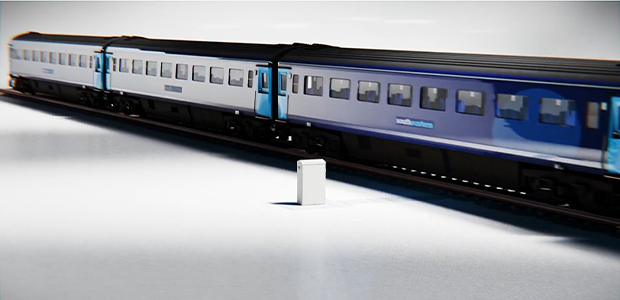
South Eastern Railway deploys IsoMat tech to keep trains running in hot weather
A new type of technology is being trialled on the Tonbridge to Hastings railway line to help keep trains running in hotter weather, and more reliable journeys for passengers and freight customers.
The South Eastern Railway has partnered with UK greentech startup Flint Engineering to combat excessive heat in railway signalling cabinets that can exceed 70°C, with a new patented system that requires no power, maintenance, or internal cabinet modifications, and can be installed in under an hour.
Flint's innovative IsoMat technology delivers peak temperature reductions of over 21%, on the hottest days, transferring thermal energy thousands of times more efficiently than copper or aluminium alone.
The collaboration will see the deployment of Flint's IsoMat technology on 10 of the Kent Route’s highest risk cabinet locations this summer, strengthening resilience against increasingly frequent hot weather events. Flint Engineering’s partnership with the South Eastern Railway will combat the growing challenge of heat-related failures in critical railway signalling infrastructure.
Following a successful pilot trial, Flint is now preparing to deliver an increased number of IsoMat units for deployment across more of the Route's highest-risk cabinet locations in time for summer 2026.
Working closely with Network Rail’s Technical Authority and Contracts & Procurement department, this trial forms part of a wider exploration of sustainable solutions to combat the effects of climate change, such as passive cooling technologies, with future large-scale deployments subject to Network Rail’s standard procurement and evaluation processes to ensure fair and open competition.
David Davidson, chief operating officer for the South Eastern Railway, said: "As extreme weather events become more common, we need innovative solutions to protect our infrastructure, and most importantly keep our passengers and freight customers on the move.
“Flint's IsoMat technology provides a simple, effective solution to a complex problem, helping us maintain service reliability even during heatwaves without requiring power, maintenance or complicated installation procedures."
Mark Robinson, CEO of Flint Engineering, said: "Our partnership with Network Rail represents a perfect application of our technology where it can make a real difference to critical infrastructure. The IsoMat demonstrates how innovative engineering can address climate resilience challenges while delivering significant operational benefits. This collaboration highlights exactly the kind of practical applications we envisioned when developing this breakthrough technology."
The IsoMat system is notable for its ease of installation, requiring just two people under an hour to fit with no modification to the cabinet itself. With no moving parts and zero maintenance requirements, it delivers long-term performance in the harshest conditions.
Network Rail, which nationally owns and manages 20,000 miles of track, 30,000 bridges, tunnels and viaducts and thousands of signals and level crossings, has been grappling with a significant operational challenge: excessive internal temperatures in signalling cabinets during hot weather, which can exceed 70°C. This can lead to system failures, resulting in train delays, service disruptions, and substantial maintenance costs, while posing significant risks to overall rail reliability.
This partnership comes as Flint Engineering begins commercial production of IsoMat this year, with significant interest already emerging from the UK, North American, and Middle Eastern markets. The technology has applications across multiple industries such as construction, commercial refrigeration and electrification, where efficient temperature management and energy conservation are priorities.
Flint Engineering's response to this challenge is the IsoMat, a patented passive heat exchanger that mounts to cabinet roofs without requiring power, maintenance, or internal modification. The innovative solution reinvents traditional heat pipe technology through a revolutionary flat aluminium sheet design featuring an internal network of sealed channels.
When exposed to extreme temperatures, the liquid within these channels undergoes a rapid cycle of evaporation and condensation, resulting in near-instantaneous heat transfer.
Early trials conducted by Network Rail showed remarkable results, with a reduction in peak internal temperatures of over 21%. IsoMat enables thermal energy transfer thousands of times more efficiently than copper or aluminium alone, dramatically accelerating heat dissipation from sensitive electronic equipment.
For more startup news, check out the other articles on the website, and subscribe to the magazine for free. Listen to The Cereal Entrepreneur podcast for more interviews with entrepreneurs and big-hitters in the startup ecosystem.

